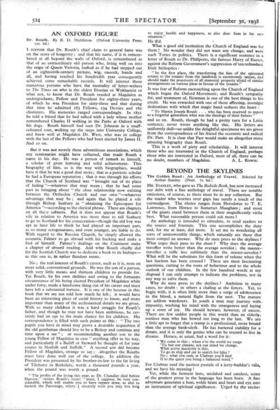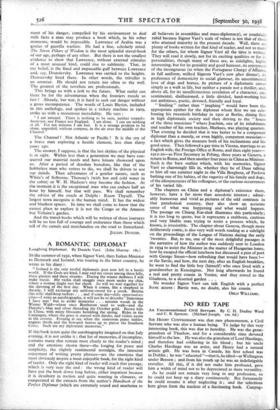BEYOND THE . SKYLINES
MR. STANLEY, who gave us The Bedside Book, has now increased our debt with a fine anthology of travel. There are notable omissions, of course, as there must be in any collection. But the reader who worries over gaps has surely a touch of the curmudgeon. The choice ranges from Herodotus to T. E. Lawrence, from Horace to Somerset Maugham ; and most of the giants stand between them at their magnificently virile best. What reasonable person could ask more ?
An anthology is intended to stimulate, to send readers to the source and fountain. This one accomplishes the duty and, for me at least, did more. It set me to wondering all sorts of unanswerable things; which naturally are those that most compel an answer. Why do men press to the skylines ? What urges their pens to the sheet ? Why does the average traveller write better than the average novelist ; the master-• traveller a trifle less sublimely than the master-novelist ? What will be the substitute for this form of release when the last horizon has been crossed ? These are most fascinating questions, cutting to the roots of behaviour and to the whole outlook of our children. In the few hundred words at my disposal I can only attempt to indicate the problems, not- in any way to solve them.
Why do men press to the skylines ? Ambition in many cases, no doubt : in others a chafing at the fetters. Yet, to begin with, it is often little more than a surge of adolescence in the blood, a natural flight from the nest. The mature are seldom wanderers. In youth a man may journey with impunity, washing his mind with the strangeness and laying
up a store of joy. He should beware, however, of excess. There are few sadder people in this world than an elderly, rootless man who has bowed too long to the lust. We are a little apt to forget that a tramp is a professional, more bound
than the average bank-clerk. He- has bartered stability for a dream, and it is only the genius who can be trusted to live in dreams. Horace, as usual, had a word for it: " We come to this ' • when o'er the world we range 'Tis but our climate, not our mind we change. What active inactivity is this, To go in ship and car to search for bliss ! No ; what you seek, at Ulubrae you'll find If to the quest you bring a balanced mind."
For Ulubrae read the nastiest pustule of a jerry-builder's villa, and we have his meaning !
Yet, while the ferment lasts, unslaked and careless, some of the greatest prose in the language has been born. A fine adventure generates a heat, welds brain and heart and eye, into
an instrument of spiritual significance. Urged by the excite- ment of his danger, compelled by his environment to deal with facts a man may produce a book which, in his sober moments, would be impossible. Lawrence of Arabia was a
genius of guerilla warfare. He had a fine, scholarly mind. The Seven Pillars of Wisdom is the most splendid travel-book
of our age, perhaps of any other. But there is not the smallest evidence to show that Lawrence, without external stimulus of a most unusual kind, could rise to sublimity. That, in my belief, is the fixed and impassable gulf between Lawrence and, say, Dostoievsky. Lawrence was carried to the heights.
Dostoievsky lived there. In other words, the traveller is an amateur. He should not return too often to the well.
The greatest of the novelists are professionals.
This brings us with a jerk to the future. What outlet can there be for the adventurous when the frontiers recede so fast ? Already, bar war, it is hard to seek out danger without a gross incompetence. The words of Louis Bleriot, included in this anthology, and spoken in a rickety machine in 5909, strike us with a monstrous incredulity. He says :
" I am amazed. There is nothing to be seen, neither torpedo- destroyer, nor France nor England. I am alone. I can see nothing at all. For ten minutes I am lost. It is a strange position to be alone, unguided, without compass, in the air over the middle of the Channel."
The Channel I Not Atlantic or Pacific ! It is the cry of a brave man exploring a hostile element, less than thirty years ago.
The answer, I suppose, is that the last skyline of the physical is in sight. Within less than a generation we may have con- quered our material needs and have leisure showered upon us. After a period of desolate boredom, like that of the hobbyless man who retires to die, we shall be driven to use our minds. Then adventures of a gentler nature, such as White's of Selborne, Thoreau's (with hot and cold water in the cabin) or W. H. Hudson's may become the fashion. At the moment it is the exceptional man who can endure half an hour by himself, but that will pass. We shall remember the advice of the oracle at Delphi : Know Thyself. The largest terra incognita is the human mind. It has the widest and blankest spaces. In time we shall come to know that the
easiest place to explore it is not the Congo or the Amazon
but Voltaire's garden.
And the travel-books which will be written of those journeys will be no less full of courage and endurance than those which tell of the camels and merchandise on the road to Samarkand.
JULIAN DUGUID.















































 Previous page
Previous page